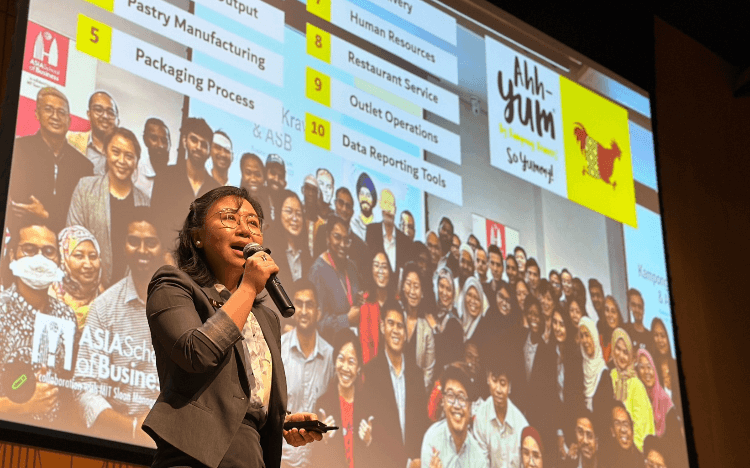It’s said that theory can only take you so far—and this is certainly true for a career in business.
While learning the fundamentals of business is an essential part of your MBA development, the chance to apply this knowledge in a practical setting will enhance your skill set and prepare you for the world of work after graduation.
It’s this belief in the importance of Action Learning that underpins the Asia School of Business MBA program.
Built upon the Malaysia-based school’s close partnership with MIT Sloan School of Management, pioneers of the Action Learning pedagogy—hence the MIT motto: “mind and hand”—ASB focuses on enhancing students’ MBA immersive experiences and preparing them for career success through a wide variety of practical opportunities.
The Action Learning philosophy
While Action Learning has long been a key focus at ASB, the school has recently updated the MBA curriculum to bring the principal to the very core of students’ experience.

Alongside their core MBA classes, students embark on a series of practical opportunities throughout the 12-month degree. This begins with an Industry Trek, where they spend time in a new country, networking with local leaders, experiencing the local culture, and understanding local business practices.
This is followed by a Business Practicum, where the entire cohort splits up into teams, working with a particular company to solve real business challenges across the company’s operations.
Next, students embark on a three week team-based project to various locations in Asia, hosted by companies across several industries and functions.
Finally, students undertake their own individual extended period or internship working with a host company.
“There’s real incremental value in the way that students are experiencing the MBA journey,” says Sangeeta Matu (pictured), director of Action Learning at ASB.
“They go on the Action Learning journey, twice with their cohort, then as a team, then as an individual; each time in different countries, industries, and teams to solve real business problems with the frameworks and tools they’ve learnt in class.”
These skills include problem identification, gathering and analyzing data, proposing solutions, and making presentations.
A diverse, culturally immersive experience
At the beginning of the Action Learning process students have the chance to review the opportunities on offer and opt for the projects they feel best fit with their career goals.
For Nazatul Ruhaiza Abdul Wahab, a former civil servant with the Ministry of Finance in Malaysia currently studying on the program, her choices have allowed her to focus on a diverse range of industries and problems.

A mother of three, Nazatul (pictured) holds more than 20 years of civil service experience. During the MBA she’s spent time working in marketing for Kuala Lumpur-based EQ Hotel, solving cultural enhancement issues for Phu Hu’ung Life Insurance in Vietnam, and interning with Tune Protect Group.
Gaining diverse immersive experiences has played a large part in her development outside of the classroom. Spending time in Vietnam, for example, meant learning the intricacies of a different country, navigating a language barrier, and working with people who hold alternative perspectives.
With Action Learning such a large part of the ASB MBA curriculum, shying away from the limelight is impossible as you are forced to actively participate.
“It has been a transformative and enriching experience for me. It has not only boosted my confidence, but also taught me to face challenges head on.”
Developing a holistic skill set
All of the various experiences students embark on during the ASB MBA are highly independent.
At the beginning, students connect with partner companies and are presented with problem statements; from then on the school encourages the student teams to own their engagement with the host.
At various points throughout the year, they must deliver presentations to faculty and their peers based on their project findings.
This system has helped Nazatul develop a broad range of skills. She’s enhanced her presentation abilities, developed her critical thinking and problem solving skills, and also been able to improve her understanding of data analytics.
Working within a team of diverse individuals who come from different countries and industries has also required her to become a more adept communicator.
“It has taught me to be adaptable, think critically, and collaborate effectively with others,” she explains. “It has also provided me with a broader perspective on various issues.”
Unlocking your career potential
Developing and honing such a broad spectrum of skills, Nazatul’s journey encapsulates what ASB was attempting to achieve when implementing the Action Learning process.
The holistic skill set prepares students to go on and achieve their career goals after graduation—whether that be to switch careers or to take the next step in their current industry.
It also prepares them to be highly adaptable leaders in a volatile modern business landscape, explains Sangeeta.
“To become agile, you need to apply your knowledge, and learned experience” she says. “Action Learning gives you a sequence of opportunities to develop agility in ways and areas that you may not otherwise have been exposed to. ASB offers a truly unique MBA program.”
For Nazatul, with several months until graduation she is still weighing up her future options. An opportunity with her intern company, Tune Protect Group, could be on the cards, while she could also return to the civil service. She’s even been offered the opportunity to undertake a PhD.
Whatever she decides, Nazatul feels passionate about the prospect of continuing to learn and progress in her career.
“When I took the challenge of pursuing an MBA I wanted to show my kids that you should have this period of continuous learning and wanting to improve yourself.
“The program not only enhances your skills and professional development, it also instills a mindset of continuous improvement.”
This article was originally published on BusinessBecause, a network helping MBA students make connections before, during and after their MBA.





